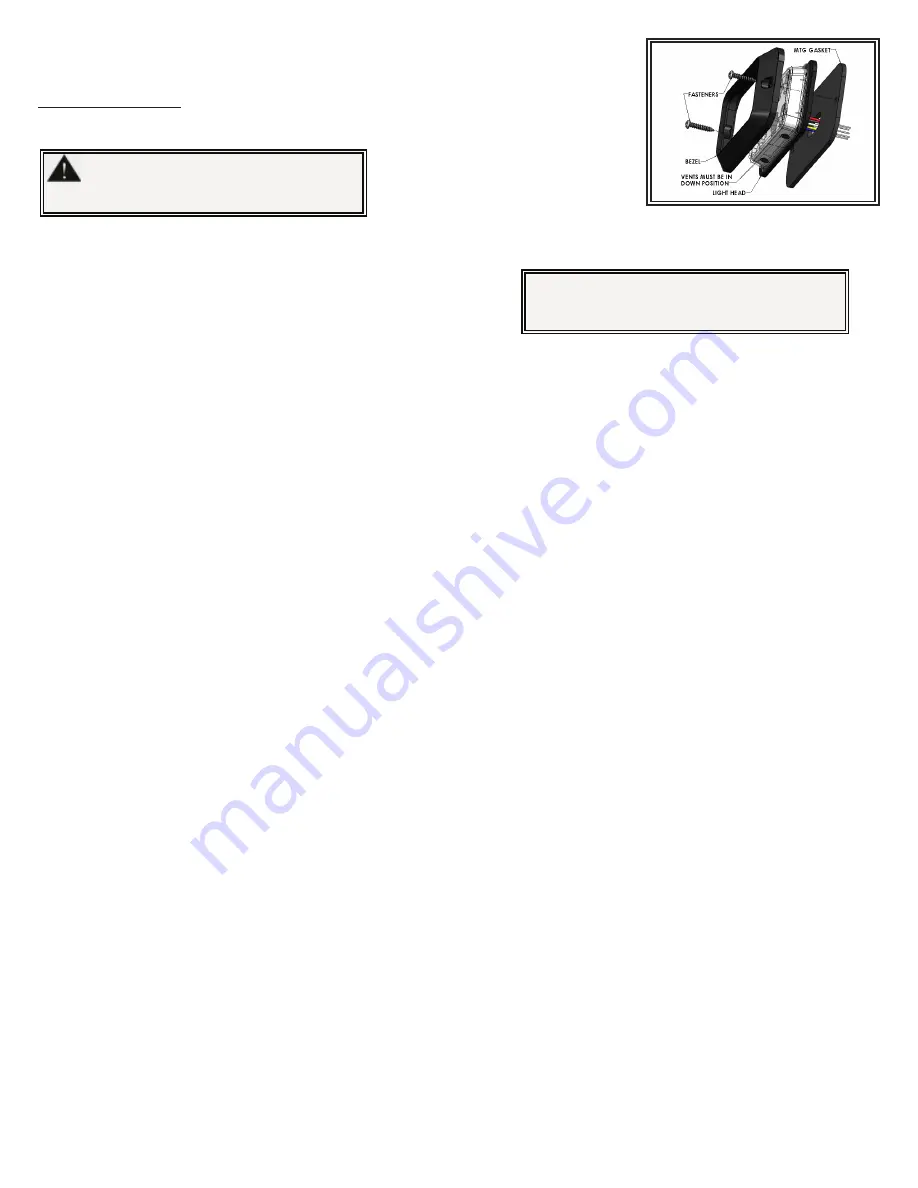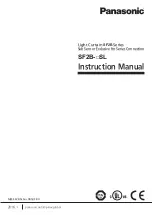
Page 2 of 4
A variety of flash patterns may be chosen for the light head. The Dual Stack light heads are split horizontally and vertically providing 4 separate lighted areas in each
light head that may be chosen to flash up-down, right-left, diagonally, and to rotate. The Split Dual Color version also provides different colors for the upper level versus
the lower level.
A separate flash pattern may be assigned for the power wires red, white, or both connected together and the pattern operated depending which wire or wires are ener-
gized. Power the red or the white wires (or both together) then use the pattern select blue wire (touch to ground) to select the chosen flash pattern from one of the lists
below.
Note: The split dual color light heads have a separate flash pattern list.
See the legend at the top of the pattern lists for compliance with various standards.
Pattern Select Operation:
Notes on Synchronizing and Phase (Sync Ph):
Notes on Choosing Flash Patterns:
Notes on Dim Control:
Wiring Instructions:
RED: Positive, (5A fuse required)
WHITE: Positive, (5A fuse required)
BLACK: Negative
BLUE: Pattern select to negative -- Dim control to positive
YELLOW: Synchronized Function (Up to 32 units can be Synchronized)
Important!
This unit is a safety device, and it must be
connected to its own separate, fused power point to as-
sure its continued operation should any other electrical
accessory fail.
(Up to 32 light heads can be Synchronized by connecting their yellow wires).
When the yellow wires of the light heads are connected together, the group with Ph1 flash patterns will flash simultaneously. If the light heads in the second group are
set to Ph2 flash patterns, they will flash alternately with the first group. To simplify the set-up of a synchronized installation, the following process is recommended:
1. Before connecting the yellow wires together, choose the desired flash pattern for each light head.
The patterns chosen must have the same flash rate for all light
heads intended to be synchronized. (By definition a 75fpm light head will not sync with at 120fpm light head)
To avoid confusion set each light head in-
dividually to the chosen flash pattern using the blue pattern select wire. Ph1 light heads will alternate with Ph2 light heads and simultaneously with all other light
heads set to Ph1. Ph2 light heads flash simultaneously with all other light heads set to Ph2. It is also strongly recommended that the same style of flash pattern
be used on all heads to produce the most effective warning pattern.
2. Connect the yellow synchronization wires together and check that the light heads are flashing in a synchronized manner as expected. If a pattern for one light head
appears to be wrong, keep the yellow wire connected and use the blue pattern select wire to cycle forward or backward for that individual light head until the cor-
rect pattern is selected. Once that is completed verify the light head is synchoronized correctly.
The light head intensity may be reduced if necessary. The Blue wire when connected to positive will reduce the intensity to 25% for SAE patterns. NOTE: The blue wire
must be disconnected from any voltage when not activating DIM nor changing flash patterns.
The light head flash pattern may be changed by touching the Blue wire to ground for the following intervals (while the light head is flashing):
NOTE: The blue wire must be disconnected from any voltage when not activating DIM nor changing flash patterns.
- When the light head signal becomes steady, disconnect the Blue wire and the flash pattern will increment by one pattern.
- When the light head signal becomes steady, then goes off, disconnect the Blue wire and the flash pattern will decrement by one pattern.
- When the light head signal becomes steady, then goes off, then becomes steady again, disconnect the Blue wire and the flash pattern will reset to the factory default
pattern.
- When the light head signal becomes steady, then goes off, then becomes steady again, then goes off again, disconnect the Blue wire and the flash pattern will become
set to the steady burn mode.
Caution!
When drilling into any vehicle surface,
make sure that the area is free from any electrical wires,
fuel lines, vehicle upholstery, etc. that could be damaged.
Installation and Mounting:
To mount the light head, use the bezel as a template to mark the mounting holes. The supplied self-tapping #6 x 0.75”
screws typically use 0.125” diameter holes but this may vary depending on the type of material and the thickness being
tapped. Provide a minimum 0.50” diameter hole for the wires. Grommet the hole if possible and seal with RTV sealant.
It is important to note:
The light head has 2 small round holes covered with vent membrane that must face downward when mounting
the light head.
MAX 20in lbs






















